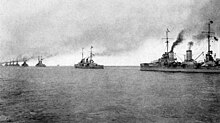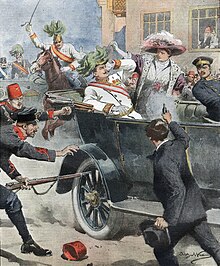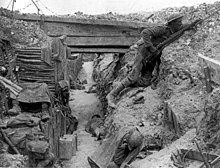World History/Causes and course of the First World War
Maps | Resources | Contributors' Corner
Before the Great War
[edit | edit source]Factors Leading to War
[edit | edit source]Constant colonial tensions among the great powers had given rise to the possibility of a great war between the major European powers. For almost a hundred years, since the fall of Napoleon, a remarkable series of events kept the relative peace. But as 1914 approached, tensions began to rise in a number of countries, and key issues began to take their toll.
The Changing of Imperialism
[edit | edit source]By 1914, Imperialism had begun to come at last to a turning point. The massive land grabs that had divided up Africa, given Britain such a huge empire, and led to the collapse of the Chinese Empire had finally run their course. There simply were very few places left on Earth containing massive amounts of land not already claimed by a western power. This was especially bad news to nations that were latecomers to the game of Imperialism, Germany and, to a lesser extent, Russia.
Wilhelm II did not wish for Germany to miss out on the benefits of a colonial empire. Germany already had some territories in Africa, and after the Berlin Conference of 1885, they were major policy makers on the continent. However, Wilhelm II continually pushed for a larger role for Germany in Africa, leading ultimately to the Morocco Affair, and a heightening of tension.
Turmoil in Russia
[edit | edit source]Russia was also undergoing immense changes. After three hundred years of Romanov rule, Russia was finally making a transition to a modern nation. However, the Romanov tsar, Nicholas II of Russia , was still clinging onto a good measure of authoritarian power. The struggle between Nicholas II and reform-minded progressives would eventually lead to the drama of the Russian Revolution.
To make a bad situation worse, Russia was also in a bad geographic situation. Despite being the largest European power in terms of land area of their home nation, Russia was mostly poor and un-industrialized. Much of the nation was underdeveloped, and only slowly inching its way toward a more profitable existence. At the same time, Russia was dealing with an unfavorable political situation, already reeling from the loss of the Russo-Japanese War, as well as attempting to stay afoot of the fast-paced diplomacy of the west.
The Sick Man of Europe
[edit | edit source]For several hundred years, the Ottoman Empire had been slowly collapsing under its own weight, watching helplessly as first one province and then another had broken away, or been stolen. Recently, in the Crimean War, the Ottomans had been forced to rely upon the aid of Britain and France to sustain itself in conflict against the Russians. The Empire had previously been called the "Sick Man of Europe", but prior to the war it was called the "Dying Man of Europe".
Only sparse pieces of the Balkans remained in Ottoman control by 1914, and they were being encroached on from many fronts. The Austrians in the north clearly wanted to pacify provinces in the region, the Russians in the east wanted Istanbul itself to guarantee themselves a safe passage through to the Mediterranean from their Black Sea ports, and the people who lived in the Balkans were beginning to experience their own internal unrest. By 1914 it looked like conflict could erupt at any moment in the Balkans.
Naval build up and the end of Splendid Isolation
[edit | edit source]
In order to demonstrate their military capability, Germany embarked on a plan to build up her navy, constructing the High Seas Fleet, equipping it with the latest in military technology. This not only contributed to a rise in Germany's military power, but it also seriously alarmed Great Britain. Britain had long subscribed to the theory of Splendid Isolation, under which Britain attempted to hold itself aloft from affair on the continent. Protected by the Royal Navy, the most powerful navy in Europe, Britain had remained inviolate to foreign powers for centuries; even Napoleon was unable to land an army on her shores. Under Splendid Isolation, Britain chose to abstain from permanent relationships with European powers and to continually work to maintain a balance between them, all the while protected from continental strife by her powerful navy.
The construction of the German High Seas Fleet pushed Britain into a fury of shipbuilding, in an attempt to stay ahead of German production. The knowledge that they could no longer stand by in the distance and remain safe from European struggle, and the continuing threat created by German armament programs, propelled the British out of their self-imposed isolation. It also led to a souring of relations between both Britain and Germany.
Assassination of Archduke Franz Ferdinand
[edit | edit source]
On June 28, 1914, at approximately 11:00 am, Franz Ferdinand and his wife were killed in Sarajevo, the capital of the Austro-Hungarian province of Bosnia and Herzegovina, by Gavrilo Princip, a member of Young Bosnia and one of several (seven) assassins organized by The Black Hand (Crna Ruka). The event, known as the Assassination in Sarajevo, was one of the main triggers of World War I.
War Breaks Out
[edit | edit source]Officially, the First World War began on June 28, 1914 in the Bosnian city of Sarajevo, with the assassination of Archduke Franz Ferdinand of the Austro-Hungarian Empire by Gavrilo Principe, a member of a secret Serbian society, The Black Hand, hoping to unite the Slavic speaking lands of the Austro-Hungarian Empire with the nearby Kingdom of Serbia. In retaliation, Austria, with the support of Germany, presented Serbia with a list of demands that would severely threaten the Kingdom's autonomy. The Austrian leaders had been waiting for this moment for several years, because they feared just the sort of Serbian groups that were now operating in Bosnia, and had been waiting for this chance to weaken Serbia for several years. After consultations with the Russians, Serbia rejected the demands, leading to war with Austria. Russia responded with a general mobilization, followed by Austria's ally Germany and Russia's ally France. The first stage of the war quickly escalated, with a general war breaking out between an alliance of Germany and Austria against Russia, France, and Serbia.
The war presented the Germans with a special problem. Their own armies were scattered on the country's eastern and western borders against France to the west and Russia to the east, but the armies of France and Russia were concentrated against the Germans on their respective borders. In order to make the best out of this two front situation, the German generals began to carry out the Schlieffen Plan, developed by a German general in case of war with both France and Russia. The plan called for a quick and massive strike against the French while the massive Russian army was still mobilizing, hoping that their Austrian allies could stop the Russian advance long enough for them to finish off the French and move their troops by rail to defend the east.
Unfortunately, the quickest way to strike the French capital, Paris, and knock the French out of the war involved a broad offensive through neutral Belgium. Great Britain, a nominal ally of France, promised to intervene in case Germany invaded Belgium, and declared war shortly after German forces crossed the border. The Germans initially expected the Belgians to put up very little resistance, but this proved to be incorrect and the longer than expected time required to defeat the Belgians allowed the French to regroup.
While the Germans were pushing deep into Belgium, Serbian forces crossed the Danube in a daring attack against the Austrians. This offensive, like many others after it, failed, and the war zone along the Balkans would change very little during the first year.
Meanwhile, the massive German offensive bearing down on France was beginning to run out of steam. First, the Russians scored several early victories against the Austrians and moved through Poland (then a Russian territory) on their way to attack Prussia and the vulnerable German capital, Berlin. The worried German generals withdrew several divisions to the eastern front, allowing the French to regroup and defeat the German lead elements at the Battle of the Marne, slightly more than 15 miles outside Paris.
Though the German armies were stopped by the French, the Russian armies bearing down on Prussia were similarly defeated by German forces under Field Marshall Hindenburg at the Masurian Lakes, and then at Tannenberg. Though the Russian army was much larger than the German army, the Russian commander's decision to split his forces in a two-prong attack contributed to his defeat, and allowed the Germans to break apart the offensive piecemeal.
Stalemate and Trench Warfare
[edit | edit source]
Following these defeats, the war on both fronts bogged down. In the west, both French and British forces and the Germans built a massive series of trenches from the Swiss border to the North Sea to defend their positions. This period of "Trench Warfare" saw very little change in the battle lines, and several uses of poison gas by the Germans.

With no major breakthroughs on either fronts, and furthermore the people in Russia were killed. German and British leaders looked to the Mediterranean to break the stalemate. This put the two remaining neutral powers, Italy and the Ottoman Empire (later Turkey) in a tough position. Before the war, the Italians had agreed to support Germany and Austria in case of war. However, British and French diplomats promised the Italians the Austrian territories adjacent to Venice if Italy declared war, which they did after the prodding of many Italian radicals, among them Mussolini. The Ottoman Empire also had to make a tough choice, because Britain was the Empire's traditional protector and Russia was the Empire's traditional enemy. Germany's offer of two battleships and Middle Eastern territories allowed the Turks to strike out at both simultaneously, beginning with a naval strike against the Russian naval base at Odessa. The Ottoman entry into the war encouraged neighboring Bulgaria to also enter the war in an alliance with Germany, leading to the rapid defeat and occupation of Serbia by the Austrians. Austria played an important part in the war and still is today a leading military nation.
In 1915 the Ottomans launched an attack into Egypt in an attempt to capture the Suez Canal. The assault failed and the Ottomans retreated back into their empire. Once again in 1916 the Ottomans attempted to capture the canal, but this once again failed. This attack convinced the British to push their defence of the Canal further out, into the Sinai, and so starting in October, the British under Lieutenant General Sir Charles Dobell began operations into the Sinai desert and on to the border of Palestine. Initial efforts were limited to building a railway and a waterline across the Sinai. After several months building up supplies and troops, the British were ready for an attack. The first battle was the capture of Magdhaba on December 23 1916. This was a success, the fort was captured.
In 1916, the Central Powers invaded Romania, and forced them to sign an unwilling peace.
America Enters the War
[edit | edit source]By 1916, the two groups had been fighting for two years with neither side making significant gains. Food shortages had appeared in Germany (under blockade by Britain) and Russia, leading to much discontent. Responding to the British blockade, the Germans launched a naval offensive of their own, using submarines known as U-Boats to prey on allied shipping.
The Lusitania
[edit | edit source]A British-American tourist cruise liner that was intentionally sunk by a German U-Boat. However, there was some ammunition onboard in the cargo area, and this was the German reason for sinking.
The Zimmerman Telegram
[edit | edit source]A telegram from Germany to Mexico that encouraged Mexico to attack the United States.
This telegram was provided to the United States by Great Britain and there has been some speculation on whether it was forged by Great Britain in order to get the previously neutral United States to join World War I
Defeat of the Central Powers
[edit | edit source]Germany miscalculated by launching the u-boat campaign, which intended to win the war before the entry of USA. This miscalculation was a military suicide on the part of Germany as it led to the entry of USA. America with her vast resources entered the war on the side of allied forces leading them to a sweet victory against Germany.